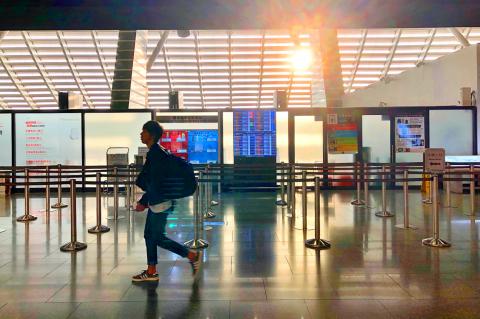The number of passengers accessing Taiwan Taoyuan International Airport last year grew 3.69 percent from a year earlier to 46.53 million, Taoyuan International Airport Corp (TIAC, 桃園國際機場公司) said yesterday, adding that the result means it is one of the world’s 50 busiest international airports.
Citing 2017 statistics from the Airports Council International, the airport company said that only about 50 airports among more than 50,000 international airports worldwide were accessed by 40 million or more passengers per year.
“This means that Taiwan Taoyuan International Airport has made it to the major leagues of airports,” TIAC said.

Photo: CNA
The company also attributed continued growth in the number of passengers accessing the airport to booming development among low-cost carriers, as well as the government’s New Southbound Policy.
Compared with 2017, passengers on low-cost carriers rose by 12.05 percent to reach about 8.49 million last year, the company said.
Meanwhile, the number of air travelers from nations targeted by the policy — Southeast and South Asian nations, as well as Australia and New Zealand — increased by 9.84 percent to 11.32 million, TIAC data showed.
The number of passengers from China rose 1.91 percent to 8.03 million, the company said.
To meet the challenges introduced by continued growth in passenger numbers, TIAC said that it has expanded service areas in Terminal 2 and is pushing for construction of its third terminal.
The airport has also provided self-service check-in facilities and electronic passport-control gates to improve service quality, it said.
Meanwhile, EVA Airways Corp (長榮航空) was rated by AirlineRatings.com as one of the 20 safest airlines in the world, along with Qantas Airways Ltd, All Nippon Airways Co, Cathay Pacific Airways Ltd (國泰航空), American Airlines Group Inc, Emirates, Qatar Airways Ltd, Lufthansa AG, Singapore Airlines Ltd and Air New Zealand Ltd.
EVA Airways has made the list’s top 20 safest airlines for six years consecutively.
The result, which was released on Thursday, came after the Web site evaluated the flight safety performance of 405 airlines over the past 10 years.
It takes various indicators into consideration, including safety inspection results from civil aviation authorities, fleet management, standards for aircraft maintenance and flight safety records.

INVESTIGATION: The case is the latest instance of a DPP figure being implicated in an espionage network accused of allegedly leaking information to Chinese intelligence Democratic Progressive Party (DPP) member Ho Jen-chieh (何仁傑) was detained and held incommunicado yesterday on suspicion of spying for China during his tenure as assistant to then-minister of foreign affairs Joseph Wu (吳釗燮). The Taipei District Prosecutors’ Office said Ho was implicated during its investigation into alleged spying activities by former Presidential Office consultant Wu Shang-yu (吳尚雨). Prosecutors said there is reason to believe Ho breached the National Security Act (國家安全法) by leaking classified Ministry of Foreign Affairs information to Chinese intelligence. Following interrogation, prosecutors petitioned the Taipei District Court to detain Ho, citing concerns over potential collusion or tampering of evidence. The

NEGOTIATIONS: Taiwan has good relations with Washington and the outlook for the negotiations looks promising, Minister of Economic Affairs J.W. Kuo said Taiwan’s GDP growth this year is expected to decrease by 0.43 to 1.61 percentage points due to the effects of US tariffs, National Development Council (NDC) Minister Paul Liu (劉鏡清) said at a meeting of the legislature’s Economics Committee in Taipei yesterday, citing a preliminary estimate by a private research institution. Taiwan’s economy would be significantly affected by the 32 percent “reciprocal” tariffs slapped by the US, which took effect yesterday, Liu said, adding that GDP growth could fall below 3 percent and potentially even dip below 2 percent to 1.53 percent this year. The council has commissioned another institution

TRADE: The premier pledged safeguards on ‘Made in Taiwan’ labeling, anti-dumping measures and stricter export controls to strengthen its position in trade talks Products labeled “made in Taiwan” must be genuinely made in Taiwan, Premier Cho Jung-tai (卓榮泰) said yesterday, vowing to enforce strict safeguards against “origin laundering” and initiate anti-dumping investigations to prevent China dumping its products in Taiwan. Cho made the remarks in a discussion session with representatives from industries in Kaohsiung. In response to the US government’s recent announcement of “reciprocal” tariffs on its trading partners, President William Lai (賴清德) and Cho last week began a series of consultations with industry leaders nationwide to gather feedback and address concerns. Taiwanese and US officials held a videoconference on Friday evening to discuss the

NEGOTIATIONS: The US response to the countermeasures and plans Taiwan presented has been positive, including boosting procurement and investment, the president said Taiwan is included in the first group for trade negotiations with the US, President William Lai (賴清德) said yesterday, as he seeks to shield Taiwanese exporters from a 32 percent tariff. In Washington, US Trade Representative Jamieson Greer said in an interview on Fox News on Thursday that he would speak to his Taiwanese and Israeli counterparts yesterday about tariffs after holding a long discussion with the Vietnamese earlier. US President Donald Trump on Wednesday postponed punishing levies on multiple trade partners, including Taiwan, for three months after trillions of US dollars were wiped off global markets. He has maintained a 10 percent